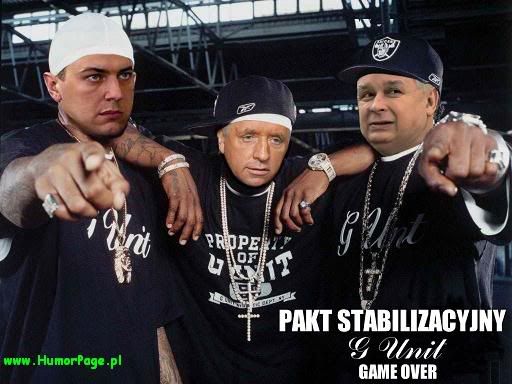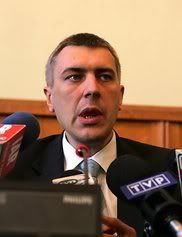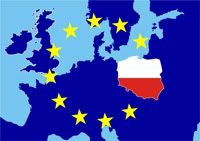*roundtrip ticket
Duck and Brussels sprouts
 Prime Minister Jarosław Kaczyński is using his first trip to Brussels to set the record straight Prime Minister Jarosław Kaczyński is using his first trip to Brussels to set the record straightYou might not know it, but there are some nasty rumors going around about Poland in the EU. Whispers in the halls of Brussels and Strasbourg can be heard accusing Poland of xenophobia, homophobia, and even anti-Semitism.Yucky stuff. Fortunately, Prime Minister Kaczyński flew into Brussels yesterday to tell those nasty Brussels bureaucrats that all of that is absolutely, 100% untrue! From theparliament.com:
"Don’t believe in the myth of anti-Semitic, xenophobic Poland," Kaczynski told a Brussels press pack.
"There are homosexuals in Poland who have very high positions in politics and even on the right of politics. This is a media thing, it is not real."
Well. That clears everything right up.
As promised
Solidarity activists are defending Deputy Defense Minister Antoni Macierewicz
As I mentioned below, Deputy Defense Minister Antoni Macierewicz has been in some pretty hot water recently over statements he made accusing Poland's former Foreign Ministers of spying for the Soviets.
In response to heavy criticism of Macierewicz's un-supported accusations in the media, some of his former Solidarity colleagues sent an open letter of support to Prime Minister Jarosław Kaczyński. It read thusly:
The authors of the letter express their trust in Minister Macierewicz, a Solidarity activist and one of the most eminent leaders of the Polish independence movement. We also have trust in the information that he said he possesses about the influence former [Soviet] agents have on the country’s current affairs and national interests.
The attack on Antoni Macierewicz is an attempt to halt actions aimed at eliminating those spies from public life and plays to the benefit of the all enemies of independence.
Eek! They're everywhere!
The information Minister Macierewicz has indicated he has, will not undermine Poland’s credibility in the international community. Countries which undertake efforts to clear their political apparatus of untrustworthy people deserve respect.
Absolutely. Say, what was that evidence again?
It is worth noting that Poland’s most influential media outlets have not bothered to analyze the minister’s statements, but instead called the information he presented untrue.
Ah, yes. I knew it. Once again, it's all the media's fault. Tell me, what were they to analyze? The accusation was simple: Most of the former Foreign Ministers were "agents of the Soviet secret services." (większość dawnych ministrów spraw zagranicznych była "agentami sowieckich służb specjalnych". ) The statement is either true or it is false. But since no evidence has been presented, how are we to analyze any further than that?
Oh yes, and isn't it the burden of the accuser to prove guilt?
The general public in Poland has the right to know the dramatic truth, so we believe that what Minister Macierewicz did was an act of patriotism intended to stress the good character of the country.
The dramatic truth: Macierewicz has no proof, and simply let loose with reckless accusations that would score him points on a politically friendly television network (Father Tadeusz Rydzyk's TV Trwam).
The same people who, back in 1992, opposed the cabinet of Jan Olszewski for its efforts to reduce the influence of post-Soviet agents, are now attacking Minister Macierewicz who is merely trying to fulfill the same goals.
The media attack against Antoni Macierewicz is in reality an attempt to halt the vetting and liquidation of the Military Information Services and to replace them by new special [secret] services.
[signed,]
Andrzej Gwiazda, Anna Walentynowicz, Joanna Duda-Gwiazda and Krzysztof Wyszkowski,
These are deeply, deeply frightened people.
Even Radio Polonia isn't safe
 Is the current PiS government so power-hungry that it has even begun bending English-language state media to its will? Is the current PiS government so power-hungry that it has even begun bending English-language state media to its will?There aren't too many websites where someone interested in Polish news can go for reliable English-language reportage. The Warsaw Voice, is, quite simply, crap – and only comes out weekly. The Warsaw Business Journal doesn't make many of its stories available to those who refuse to register, and except for their news digest service (also restricted) only comes out weekly. Poland Monthly is full of old news. The best source – at least what used to be the best source – is Radio Polonia.  I've been going there recently to read what they say about a particular scandal that's been getting much play in the news here, but very little internationally. Antoni Macierewicz – a very conservative politician and one of the leaders of the Patriotic Movement party (Ruch Patrioticzny), who was recently appointed as Deputy Defense Minister, began speaking to the media without thinking, it seems. A week or so ago, he claimed that most Foreign Ministers of Poland since 1989 have been Soviet spies. He provided no proof for his claims. This caused a political uproar, since naturally the accused wanted to see what evidence Macierewicz had which would lead him to publicly defame them. Many were also upset because the statements, understandably, riled Russia at a time when Russo-Polish relations were beginning to get a tad warmer. Andrzej Lepper, Minister of Agriculture, complained that this was not helping to convince the Russians to lift their ban on Polish meat and plant products. The media had a field day with the story, mostly because Macierewicz continually refused to present any proof whatsoever. Calls from every end of the political spectrum called for his resignation, while the Twins-in-Chief remained conspicuously silent. The calls grew so loud that Macierewicz finally apologized, saying that his statements were an “inappropriate mental shortcut” – whatever that means – but never once producing any evidence. In response to the furor, four old allies of Macierewicz from his Solidarity days wrote a letter to Prime Minister Jarosław Kaczyński supporting the Deputy Minister. The letter reads like the ravings of a madman who's watched too many conspiracy-theory films, and is full of errors of logic. In short, it's hogwash, and is so flawed that I'm forced to devote an entire upcoming post my comments on it, rather than enumerate them here. The worst part, however, is that I found the letter, unabridged, uncommented upon, hardly even introduced, on the website of the once-neutral Radio Polonia. The station's English service reaches folks from all over the globe, and has a large following. A search of the site's archives for any information on the scandal produces only this letter, as well as another short article, written earlier, reporting that the letter was sent. These two articles give credence to the government's position, without presenting any opposing view. There is little mention on the site of criticisms of Macierewicz's extremely irresponsible statements (if “causing a political storm”, and “many in the media have called for his resignation” - can be called mention of criticisms). This type of unbalanced presentation of a story has the fingerprints of PiS – which, make no mistake, is now in control of Polish Radio – all over it. Has PiS now strongarmed so much of the public sector that even the formerly balanced Radio Polonia is becoming a mouthpiece of the government? No analysis, no opposing views, just a cut and paste job hoping to spice up the news cycle with a bit of pro-PiS propaganda? Radio Polonia ought to be ashamed of itself. --- UPDATE ---It seems Radio Polonia - in the interest of reporting actual news - has published a story reporting that former Foreign Minister Wladysław Bartoszewski has resigned from his chairmanship of the council of the Polish Institute of Foreign Affairs due to Macierewicz's statements.
Sunday Vista Blogging XIII

EK for WS
Tulum, Mexico

Gus for WSOff George Town, Grand Cayman
I'll be going to jail any day now
In case you didn't know, it's a crime in Poland to insult the head of state.
Think they'll give me three years for calling the duck a dunderhead?
Putting on their election hats
 Who's the biggest populist in Poland? Who's the biggest populist in Poland?You know election season has started in Poland when populists start promising the moon. With local elections just a couple of months away, the three parties in Poland's ruling coalition have begun a game of political one-upmanship, each seeing which can promise more voters an election gift with the biggest bow, and which can portray previoius fiscal reforms as a more outrageous pillaging of the state. The pit-bull and the bugbear We start off with Law and Justice (PiS). This week the party sicced its pit-bull Artur Zawisza on that bugbear of all Polish anti-reformists, central-bank chief Leszek Balcerowicz. Zawisza heads the Banking Investigative Commission – PiS' pet project – which was created with all but the express purpose of publicly hanging Balcerowicz for all of Poland's economic woes since the transition from communism to capitalism. Just as the commission was gearing up to have its first meeting, Zawisza suggested the existence of “notes” written by Polish Special Services alleging that Balcerowicz had cheated the state during the privatization of Bank Pekao in 1999. Balcerowicz's head on a platter is just the kind of gift the ducks would love to give their constituents in the runup to the elections, and evidence that he had cheated the state out of billions would have piled up the votes for PiS. But when Balcerowicz threatened legal action against Zawisza, the pit-bull backed off with his tail between his legs faster than you can say “spayed and neutered”, whimpering that he had only pointed out a conflict of interest. The damage may be done however, as the insinuation of these notes' existence is enough to convince those who want to believe Balcerowicz pilfered state coffers. And since Balcerowicz is expected to undergo a long, nasty interrogation by the commission in front of TV cameras for the whole country to see, PiS may gain the political capital they're looking for yet. Balcerowicz, who can always be counted upon to shoot off an inflamatory quip whenever there's a microphone nearby, is so exasperated that he compared the government to that of Iran, and said it was causing Poland's democracy to “degenerate”. “There is a competition among the coalition partners as to who will be a bigger populist,” Balcerowicz told public radio yesterday morning. Back to the futureWhich brings us to the League of Polish Families (LPR), the ultra-conservative reactionaries who are in danger of not winning anything at all this election season. To pump up the poll numbers, the party has pledged to become even more hardline - and began that campaign two weeks ago with a proposal to re-introduce the death penalty in Poland.  Monday, the party's Frankenstein-in-chief, Roman Giertych, said that his party would work to enact a law allowing the government to retract the privatization of any previously state-owned firm that his party deemed unlawful, and demanded the support of the coalition partners. Which firms would be targeted, and whether the state would pay compensation to those it snatched these companies from is as yet unclear. No worries though. “The value of seized assets would be higher than potential compensation,” LPR deputy Wojciech Wierzejski guarantees. Getting this law past a little thing called the Polish Constitution would prove a herculean task, but that matters little, as the proposed law has no chance of ever seeing the light of day. However, simply proposing it just might get enough LPR voters to the polls to keep them present in some local governments.  Not to be left out, Poland's premier pugi-populist, leader of Self-defense Andrzej Lepper, has decided to buy his votes the old fashioned way: with direct handouts from the budget. He wants the government to spend more than the zł.30 billion ceiling they've set for themselves on things like miners pensions and fuel subsidies for farmers. If they don't, he's threatened – again – to leave the coalition and force early elections. “If there is not a pro-social budget...we will not approve it and this means early elections,” Lepper told public radio yesterday. Of course, nobody actually expects him to go through with this plan. He's just making sure all the farmers know whose side he's on when it comes time to head to the polls. Seriously, how can anyone believe a word he's saying anymore? How can anyone believe a word any of them say anymore? And why do the Polish people keep falling for this?
Poland “Exporting Criminals” - European News Review
 Is Poland using Western Europe as its own personal Australia? Is Poland using Western Europe as its own personal Australia?In an article entitled “Why Polish Emigration is bad for Europe but good for Poland” an author writing for the European News Review accuses the Polish government of refusing to stop the flood of emigrants from Poland because it is helping them in the polls. With lower unemployment there is less competition for jobs so this makes those who are actually looking for work in Poland happier. At the same time the Polish Government is able to use the lower unemployment figures to show that its policies are having a positive effect on the Polish economy.
The net result is that more of the Polish people are happy with the way the Polish government is running the country.
Many troublemakers and criminals have left Poland for Western Europe. The crime rate in Polish cities is down. See The author cites an unavailable (just click on the link) article from the Irish Examiner to back up these claims. Regardless of the source's unavailability, from the wording of the sentence and link, it seems that rather than proving the outrageous claim that Poland is sending its worst seeds to contaminate the Western European lands, the author uses the Irish Examiner article to more back up the claim that crime in Poland is down. Read more »
Buy stuff you don't want to save Detroit
 If he loses his pension, it's because you wouldn't buy an SUV
Is the American consumer to blame for Detroit's woes? In a column featured in Monday's Detroit Free Press, Stephen Schiavi, a graduate of the University of Detroit and a retired teacher, says that Americans' unwillingness to buy gas-guzzling American-made SUVs and trucks is the equivalent of stabbing the Detroit blue-collar worker in the back. His column mostly seems to be based on his experiences in a return visit to Detroit for a wedding, where he met several retired workers who were worried that their former employers wouldn't be able to meet their pension commitments. His concern for these folks' future is admirable, but his analysis of the problem is – to put it mildly – unadulterated protectionist nonsense. The crux of his argument is this (emphasis mine): In our quest to find cheap labor elsewhere, we have supported other countries becoming more productive, and that has advanced them economically. Therefore, we helped to implement the decline of our own economy. A common afflictionThough he graduated from a good university, Mr Schiavi is quite clearly no economist. He suffers from a common affliction, however: believing that economic growth in one country necessarily corresponds to economic downturns in another. The facts, of course, belie the problems of his argument. The US economy has been clipping along at a pace faster than developing economies like Poland, where GM, Ford, and associated manufacturing companies like Delphi have made significant investments over recent years. Most importantly, both economies were growing at a healthy rate of over five percent simultaneously. Poland's gain (for example) did not correspond to the US' loss. Referring to American carmakers' problems with funding their pension commitments, Mr Schiavi notes, "This is not happening to the foreign automakers." Indeed. One of the biggest reasons for this difference is the fact that foreign auto makers moved more quickly to offset growing labor costs by moving production to countries outside their home market. I hope that he wouldn't deny American carmakers the opportunity to do likewise and remain competitive long enough to pay off those pensions. Mea culpaAdmittedly, the US economy's growth took a dip this month that few were expecting. Could this have come as a result of Americans not buying enough Detroit cars? As Detroit thrived, so, too, did America. Not anymore. As Detroit now suffers, so do we. Any industry associated with the manufacture, or lack thereof, of American cars and automobile equipment or accessories, will also suffer. It's true enough that industries solely associated with the manufacture of American cars would take a hit due to the woes of Detroit's big car manufacturers, but few such industries exist. Let's please remember that car companies which we generally call "foreign" such as Toyota or Honda, actually produce many cars in America. As a result, the smart auto-parts producers have diversified their client base, and make products for "foreign" and domestic cars alike. Though their "American" clients may be buying less, their "foreign" clients are buying more. The Americans that these companies employ have secure jobs. The figurative fingerWhich brings us to another problem with Mr Schiavi's argument: By buying a Toyota or a Honda, American consumers are actually supporting American (though admittedly, not Detroit) workers. If by buying a Honda made in Alabama is showing the Detroit worker that "we don’t care about each other anymore," then isn't someone who buys a Ford Fusion – as his daughter plans to do – giving a figurative finger to that poor Alabama worker? What is a patriotic American-job supporting protectionist to do? (Indeed, it seems from cursory research that Honda has an emissions lab in Ann Arbor, Michigan. What would happen to the high-tech jobs there – just the sort Michigan needs, by the way – if Americans were to stop buying Hondas?!) No regretsMr. Shiavi trumpets that ever since being berated by Detroiters for driving a Honda, he has turned to American brands, specifically Ford, and has “never regretted” his purchase of an F-150. He implores others to do the same. But the Ford F-150 is a gas-guzzler that damages the environment and is expensive to drive. Being retired, Mr Schiavi probably doesn't have to worry about commuting to work, nor driving the kids to school or soccer practice. That he chooses to spend more on gas is fine, but should he expect tight-budgeted families to take on a hugely expensive purchase in order to "support the Detroit worker"? Should he expect environmentally- conscious families to contribute to global warming in order to "respond to others' problems"? In fact, the money these families save on things like gas when they buy "foreign" does not disappear. It is spent elsewhere – even on other American-based industries. It went, perhaps, towards buying a home computer – something which would have contributed to the recent boom in America's computer industry. Maybe it went towards buying more healthy locally-grown vegetables. Maybe it went towards a cafe latte from Starbucks, or Florida orange juice. Maybe it was invested in a local small business. What goes aroundBy buying cheaper – or more efficient – goods, Americans earn more money to spend elsewhere and support different sectors of the economy. When American companies move jobs to Poland, it gives Poles a better opportunity to buy American goods – like the Opel make of GM cars here, which is becoming increasingly popular. Ford and GM planned poorly and produced products of little use to the American economy. Americans quite rightly invested their money better. Ford and GM have suffered for their mistakes, and let’s pray they’ve learned their lesson. Detroit will live on, the Detroit worker will live on. As for the retirees who are caught in the crossfire, better to invest in better pension guarantee schemes and promoting private investment, than to throw our money away carelessly in the pursuit of a romantic economically patriotic ideal which hamstrings us from investing in something that would actually improve our lives.
Leaving the past in the past
 German politician Erika Steinbach
... is an idea conservatives here in Central Europe sniff atYesterday evening an exhibition opened in Germany which focuses on the plight of Germans exiled from Central and Eastern Europe in the aftermath of World War II. The event was organized by German CDU politician Erika Steinbach, whose father who was a Silesian-born non-commissioned officer in the Luftwaffe. Steinbach is the head of the German Federation of Expellees, which has been demanding for some time that now-Polish lands confiscated from Germany by the Soviets be returned to German hands. Very few, except for the odd tooth-gnashing Polish politician, has ever paid them much heed.  One of those tooth-gnashing Polish politicians is the Prime Minister of Poland, Jarosław Kaczyński, who, as soon as he heard about the offending exhibition, took time out from his vacation at the Baltic seaside to visit nearby former Nazi concentration camp Sztutowo (Stutthof) where he told reporters, “It's important to remember who were the murderers and who were the victims.”  Another is former Prime Minister and current acting Mayor of Warsaw, PiS' Kazimierz Marcinkiewicz, who has cancelled a trip to Berlin today in response to the opening of the exhibition (Polish link). For her part, Mrs. Steinbach has said that she hopes the exhibition is the first step towards the creation of a permanent center recording the suffering of the expellees. That idea has been mooted for some time, and infuriates most Poles. Chancellor Angela Merkel has said such a center ought to be considered. Making a pointPoles believe by portraying some Germans as victims of WWII, such a center would gloss-over or even challenge the idea of Germany as an aggressor during the war. Steinbach's group believes the suffering of people who were forced to leave their homes as a result of the political machinations of post-war Europe ought to be documented. Both have a point. Certainly some Germans who were exiled from western Poland at the hands of Soviet Russia must have been unsupportive of Hitler but were powerless to stop him. That Stalin forced them to leave their homes was cruel and unjust. But the suffering of those few cannot be allowed to overshadow the crimes committed by the German state during the war. A center documenting the plight of expellees might be another useful reminder of how war tears lives apart – but it should not gloss over Germany's ultimate responsibility for WWII, and emphasize that it was Stalin, not Poland, who forced these people out of the land of their births. Out of the questionGiving formerly German lands back to Germany however, ought to be out of the question. It would set a dangerous regressive precedent. If Silesia were returned to Germany, oughtn't Poland demand western Ukraine back? There would be a downward spiral of territorial disputation, and it's hard to see what good that would achieve. My own personal view is that Europe started over at the end of World War II. That war was as cataclysmic for this continent as the Biblical Great Flood. When the water receded, it started from scratch. There is no use focusing on the wave-tossed past – though it ought to be remembered. Europe's gaze ought to be set on the future. It's good then, that nobody important really takes the Federation of Expellees' proposal for reclaiming of German lands very seriously. Nobody important, except, of course, the ruling party in Poland and some prominent politicians in Germany - all of whom, because of their fixation on Europe's past, are unable to look towards the continent's future.
Breaking the bank?
 Are Poland's finances on the verge of unravelling? Are Poland's finances on the verge of unravelling?Poland's finances seem to be going from bad to worse without Zyta Gilowska at the helm, though it's questionable as to whether she could have held up to the immense pressure from the populist elements of the governing coalition to spend public funds on everything from toddlers to tractor fuel. Since she's been gone however, the fiscal irresponsibility has become uncontrollable, with the Finance Ministry issuing a plethora of warnings that Poland won't be able to meet its budget commitments. Budget bluesYesterday, new Finance Minister Stanisław Kluza warned that Poland's budget deficit would exceed the 3% of GDP limit required by Europe's growth and stability pact by 2009 but would rather come in at 3.5%. This is important because the later Poland hits that target, the farther back Poland's entry into the euro zone will be pushed. Poland is still the only new EU member without a set target date for adopting the euro. The government is having even more trouble than it expected covering this year's expenditures since all privatization activities have come to a virtual standstill. In today's Puls Biznesu, Deputy Treasury Minister Paweł Szałamacha revealed that privatization revenues for this year will equal around zł.1.2-1.5 billion – some four times less than last year. Making up the differenceWithout money flowing into the government's coffers from the sale of state assets, PiS had planned to make up the difference with dividends paid out from the profits state-owned companies. The state looked to collect a bumper crop of dividend payments this year, what with the banking sector (PKO BP), the oil sector (PKN Orlen), the IT sector (Prokom et. al), and the metals sector (KGHM – whose dividends the government forced higher, rather than allowing the investments the management wanted) all turning in fantastic profits. Unfortunately, with PKN Orlen's buyout of Mazeikiu for about zł.2 billion, the government is frantically trying to figure out where it will get the zł.530 million it had expected to squeeze out of Poland's largest company. The government is now repositioning its rhetoric on the issue. Whereas earlier Treasury Minister Andrzej Jasiński had contended that "the" lost revenue from the slowdown in privatization would be made up by state-firm dividends, his deputy, Szałamacha, is now saying that the dividends will cover "part" of the lost income. Where will the other "part" come from? We are left to presume that the state will simply take on more debt. Ugly outlookWith continued unfettered state spending and wages being forced up due to the exodus of skilled workers, the złoty is bound to end its happy run of low inflation very soon. When that happens, Poland's biggest source of income – its exports – will slow significantly, and Poland will become less attractive as a low labor-cost investment destination. At that point the government will be forced to sell off state assets, now worth much less, since it will have hung onto them as long as possible, milking them of every last penny of profit. The deficit will continue to exceed 3% of GDP, keeping the euro – with its stability and trade-enhancing effects - far out of reach.
A dirtier-than-usual oil spill
 Russia is punishing Polish oil giant PKN Orlen for barging in on what it sees as its energy-market turf Russia is punishing Polish oil giant PKN Orlen for barging in on what it sees as its energy-market turfYou may have overlooked it with all of the excitement over this week's shutdown of the Prudhoe Bay oil field in Alaska, but there is actually another pipeline in need of repair that is holding up supplies and pushing up prices - on the other side of the world, in Russia. But while the reasons for BP's shutdown seem transparent enough - after a spill in March the Transportation Department demanded the pipeline be inspected, corrosion was subsequently found, and it was determined the pipeline must be replaced - the circumstances of the Russian spill and subsequent pipeline shutdown are altogether much more suspicious. On July 29 a leak sprung from the Druzhba oil link near the border with Belarus. The leak occurred on a part of the pipeline which branches off toward Lithuania, delivering oil to the Maziekiu refinery, which Poland's PKN Orlen very recently bought after a hard-fought bidding war in a tender contested by Russia's TNK-BP, Lukoil, and Kazakh national oil and gas company, KazMunaiGaz. The leak was stopped, but according to the International Herald Tribune, Russian authorities now say that the entire section of pipeline - 70 km (about 44 miles) - will have to be replaced entirely. That's not so surprising. What is surprising however is the timing and the placement of the leak, as well as the fact that that Russian officials expect the repairs to last at least 21 months. In contrast, BP estimates it will be able to replace most of the 22-mile section of the Alaskan pipeline in question within two to three months, reports the Associated Press. From the International Herald Tribune: "The timing of this accident is very strange," said Arunas Jievaltas, a senior diplomat at the Lithuanian Embassy in Warsaw. "It happened as Orlen was wrapping up negotiations to buy [Mazeikiu] Nafta refinery. Some would say that Russia is trying to show Poland that this is the price it must pay for obtaining [Mazeikiu]. It seems that every step which is taken by a Russian energy company is motivated by politics." Some history is needed here. The stake in Mazeiku refinery which Orlen bought was originally owned by Russian-government Enemy Number One, Yukos, which sold the plant to free up capital to pay off back taxes owed to Moscow. Russia has long wanted to get its hands on Mazeikiu, as it would further strengthen Russian control over oil and gas to Europe, consolidate its power over energy supplies to former Soviet Union and satellite countries in Central and Eastern Europe, and push its energy empire even further into the West. When Yukos bought the refinery in 2002 those hopes were dashed, only to be raised again after the Russian government's harassment forced Yukos to sell. It seemed Russia would have its cake and eat it too, by forcing Yukos to sell Mazeiku, pocketing the proceeds as owed taxes, and also gaining de-facto control over the refinery when earlier this year KazMunaiGas (which is heavily dependent on Russian-state-owned companies for investment in many of its most important projects) was tipped to win the tender. Later, the Lithuanian Prime Minister vowed that his government would make use of its pre-emptive right to buy Yukos' 54% stake before allowing it into the hands of Orlen. "Orlen is not well known to us. Most doubt is caused by the ability of this company to supply oil to [Mazeikiu]. Some Russian oil companies clearly stated that no more oil would flow in this direction," - thus eliminating millions in tax revenue for the Lithuanian government, the Warsaw Business Journal reported back in March. When Orlen upped the ante with a $1.5-billion offer for Yukos' shares in May, it seemed nothing could stop the deal, though the Russian government tried its best to delay the purchase indefinitely in New York courts. Finally however, Orlen's offer was too strong, and now the Lithuanian government is actually also in negotiations to sell its 30% stake to Orlen too. Russia was incensed, and it now seems those "clear statements" referred to by the Lithuanian PM have become a reality. Russian officials insist the leak is just a wacky coincidence. The shutdown has already taken a significant toll, however. Last week, Morgan Stanley sold its 2.6 million shares in Orlen, leading to a two-percent drop in Orlen's share price. The longer the refinery has to get its crude oil by ship rather than pipeline, the less competitive it will be. So the questions that remain unanswered are: What caused this leak? Why will it take so long to fix it? And how long will Western governments allow Russia to distort the energy market in its quest for revenue, prestige, and power?
Widening the gap
 At the beginning of this month the former director of EU affairs in Poland's foreign Ministry, Pawel Swieboda, caused a stir by claiming that the current government was causing Poland to lose influence in Brussels by focusing too much on internal politics. For the government, “EU affairs are a distant question,” Swieboda told the EUObserver.com website. Later that week President Lech Kaczyński seemed to prove him at least half wrong with a sudden dive into EU political debate by voicing support for re-instituting the death penalty within the European Union. The statements have put Poland front and center on the EU's political agenda – but for all the wrong reasons. Rather than engaging the bloc, the President's proposal has widened the gap between Poland and the rest of the EU. European Union officials took Kaczyński's suggestion as an affront of the highest order. “To suggest that [the death penalty's] reintroduction could in any sense represent a positive development would be a direct attack on our common values, which are founded on respect for the basic human dignity of every person,” said Rene van der Linden, President of the Parliamentary Assembly of the Council of Europe, in an open letter to President Kaczyński.As Mr. Swieboda might have predicted, the uproar had its origins in a domestic political affair. The right-wing League of Polish Families (LPR), realizing that it has negligible support in the country heading towards this autumn's local elections, decided to set off a media storm by pledging to put a referendum on the death penalty on this fall's ballot, hoping that the resulting hoopla would help boost poll numbers. President Kaczyński may be playing LPR's game because he fears a breakup of the coalition if he doesn't, or he may genuinely believe the EU needs to reinstate the death penalty. Either way however, he knows full well that bringing back capital punishment would fly in the face of Poland's EU accession treaty, and that with such fierce opposition within Europe, the chances the for the success of his proposal were next to nil. So he must also have known that his words could have only driven the EU and Poland farther apart. Though it is doubtful that this will have a negative effect on Poland's robust economic growth in the short term, isolating Poland from Europe will certainly not help the country when it comes to negotiating future aid packages or tax legislation in the EU. Moreover, at a time when Poland ought to be cultivating its tourism attractiveness, the President's proposal had the effect of giving foreigners yet another reason to consider Poland backward and reactionary. And it's hard to see how that serves Poland's interests either internationally or domestically.
|
Duck and Brussels sprouts
The PM isn't married, do you guys think when he was talking about homosexuals having very high positions, did he refer to himself???
I think this could be true :p
Well, that's what they say...
Some friends and I were having a laugh over that possibility today.
But it would seem pretty dumb to drop hints like that to the press, wouldn't it?
As promised
Even Radio Polonia isn't safe
Once home, found an earlier report - through Google, not the archives - of criticism of Macierewicz here.
Still, posting this letter without any explanation or context is irresponsible journalism at best and propaganda at worst.
Sunday Vista Blogging XIII
Cool Pics........did I mention that Mine's Bigger Than Yours ;-)
heh.
Y'all buy tickets to football games down there so you can watch it on tv?
Anyways, you ought to know that if you want to have a big tv, you ought to keep it in a Big House.
I'll be going to jail any day now
Poland is searching for a 31-year-old homeless man after he failed to appear in court to answer a charge of insulting President Lech Kaczynski.
The man is accused of slandering Mr Kaczynski during a drunken outburst as police were questioning him at Warsaw's main train station last winter.
Wow. Y'all must be pretty bored up in Warsaw to spend so much time chasing a homeless guy. If I were held accountable for the things I said when I was drunk, I probably wouldn't be allowed to enter public airspace anymore.
Unbelievable. But it makes me wonder how the prosecutions go ahead? Does someone ring up Duckie and say: “Look, this guy was pissed, right, loads of vodka…and he said you were a bit of a c#nt. Should we prosecute?
President: I don’t mind if he called me a c#nt but did he say nasty things about my mum and her lodger? Did he call Jaroslaw’s cat a c#nt?
Prosectutor: “Er….well, he was slurring a lot and the policeman didn’t catch all he said…but he did say something about how he thought you were a paranoid, insecure, dribbling idiot who has got a chip on his shoulder. He also mentioned something about potatoes…
President: …..“Right…sue the f#cker!”
If that story hadn't been on the bbc I would have thought someone was having a laugh. Seriously. There are so many better things they could spend their time and money on.
Nice one though Beatroot, you know that's EXACTLY the way the conversation went.
Could this possibly jibe with European freedom of expression laws?
You guys seriously need a bill of rights over here. This should get you started.
You can forget about #2 though, that one causes too much trouble.
Naw... You're safe. After all, you can easily prove your case!
I really "love" the way they "entertain" us in here.
I remember one conversation with my Mom, I was maybe 6 or 7 and we talked about America, about the freedom of speech. She said: "in America one can say whatever he/she wants, can even say the president is stupid..." and I asked: "And in Poland we can't?". She replied: "Oh, noooo in here one can go to jail for this kind of behavior". And my Dad added: "it's because they have democracy there, anyone can say whatever they want..."
And this was about 20 years ago... How much did we change in here? Especially those who 'fought' to enlighten us with DEMOCRACY...
Deocracy...
Better that a poke in the eye with a sharp stick, however I think nowadays I'll take the stick!
Keep up the good work.
I'll take the Democracy, thanks.
Welcome Ed, and thanks.
Putting on their election hats
Hey! He's wearing my t-shirt! That's where it went!
He'll probably give that to the farmers too.
But all Lepper is doing is representing his constituency. The people who vote for him think privatization will threaten their jobs (probably true), and the unemployed and those who rely on state benefits are treated like dirty.
And this government and the government before it and the one before that has failed large sections of society.
So blaming Lepper for putting forward the interests of the people who vote for him is not understanding that the reason that people like Lepper are popular is because governments in general are failing a lot of people in Poland.
Lepper is just doing what he was elected to do. Just like Civic Platform wants a flat tax for its core voters. I wonder why?
Ultimately, his policies will keep his constituency poorer, longer. He's not putting forward the interests of the people - He's putting forward his own interests.
PO wants a flat tax for EVERYBODY - not just their voters. But I'm willing to question how well that would serve the country too.
don’t believe that fashionable nonsense that ALL politicians are self serving bastards. Many are. But I don’t think Lepper is of them. He is a socialist. He does not trust the market to able to deliver for everyone. He also thinks that the state should be a major player in distributing resources etc. That’s the way he thinks. His voters do to.
Civic Platform are free market of course and believe in ‘trickle down’ economics, hence the flat tax idea.
Both PO and Somoobrona believe their model to be correct.
But if you are going to accuse Lepper of self serving rhetoric then you have to do the same about Tusk and his type…flat tax obviously benefits the better off, less obviously benefits poorer people on welfare, pensions and those who rely on the state.
I think that you are accusing Lepper of only wanting to stay in power because you don’t agree with the way he thinks. And that is not a good starting point to base a political analysis on. If fact, it is not a political analysis at all.
Beatroot -
Do you not remember just a few months ago, during the election campaign, when he repeated over and over again his familiar campaign that "Balcerowicz must go!"?
Not long after, in an interview with Gazeta Wyborcza, he admitted that it was just "campaign rhetoric" and that he didn't really believe Balcerowicz should be removed. He even gave him credit for the good economy.
When someone admits outright that what they say they are fighting for is a lie, I tend to believe they are self-serving.
Nor did I say that "ALL" politicians are self-serving.
I believe that Lepper believes very strongly that capitalism has wronged Poland's farmers. But since he's been in office, he hasn't done a damn thing for them - but he's sure built up a personality cult around himself.
But you're right that I don't agree with the way he thinks.
PO, and Tusk, on the other hand, have stuck to their guns, despite the political unpopularity of a flat tax. They didn't abandon it to get into power. Indeed, when they had the chance to cave to PiS' populist demands during the coalition negotiations, they didn't, and chose to stick to their principles in opposition rather than turn around and betray their constituency. You may not agree with the flat tax, but at least they didn't abandon the idea in return for political power.
And finally, your assessment:
flat tax obviously benefits the better off, less obviously benefits poorer people on welfare, pensions and those who rely on the state
That idea is being proven wrong by examples in Estonia and Slovakia. All over the region, flat taxes have proven to INCREASE tax revenue (fewer people dodge taxes) - thus giving the state more money for handouts - or investments. Also, flat taxes attract business - which create jobs (and tax revenue...), and allow people who can work to get OFF welfare - which should be the ultimate goal.
Flat taxes certainly give the rich more money to spend. And that may be unfair. But which is better, a fair system that keeps people impoverished and dependent on the state, or an unfair one that makes people's lives better?
You see, what you are proving is not that this or that politician is lying when he says he wants to better the life for his people but that you believe in neo-liberal economics.
OK, that's your bag. But it proves nothing about Lepper other than you don't like his politics.
Did you only read the end of the comment beatroot?
I said:
I believe that Lepper believes very strongly that capitalism has wronged Poland's farmers. But since he's been in office, he hasn't done a damn thing for them - but he's sure built up a personality cult around himself.
What has Lepper done for farmers? When has he kept his word to them? I never said that he was lying when he said he wants a better life for "his people". I just implied that he was lying when he said that he would do something about it - and so he did.
When has Tusk gone back on his word? Really, I'd like to know. Though I do believe in liberal economics, I'm not tied to PO (as I've said many, many times before, my preferred party is Partia Demokratyczna). I'm willing to admit that Tusk is a slimeball that only promises flat-taxes because he wants to get elected. But I'd have to see some proof first.
Provide it please.
You can only go back on promises when you are in government. Tusk is not in government.
But when he ever does then you will see promises tumbling faster than a pack of cards. It's what politician do when they get in government and come up against the contraints and realities of being in a coalition of interests. Compromises have to be made, positions backtracked.
To present Lepper as somehow unique because he breaks promises is a little naive, to say the least.
It's normal.
But it doesn't mean that those politicians are 'just in it for themselves' blah blah blah....He believes the things he says aand has been prepared to get up off his arse and fight for those things.
Lepper represents the thinking of many in Poland and so it is legitimate that he is part of the government.
You can only go back on promises when you are in government.
Not true. Lepper was going back on his promises long before he was in government. Opposition parties make promises all the time - and keep them too. Democrats in the US Congress pledged to defeat George Bush's Social Security proposals - and did so. Lepper has been promising more handouts for farmers as long as anybody can remember. He also promised to keep Poland out of the EU. Now he supports EU membership and the farmers haven't got their handouts.
To present Lepper as somehow unique because he breaks promises is a little naive, to say the least.
That's true. It's good then that I didn't say that. Lepper doesn't just "break promises". He breaks every promise - because he promises things he can't deliver in order to get elected. What do you call politicians who knowingly promise things they can't deliver? I call them opportunists - and liars.
He believes the things he says aand has been prepared to get up off his arse and fight for those things.
Only if those things he "fights for" consists of a creating a perpetual state of unstable government by constantly threatening to pull out of government. You said compromises have to be made in politics - When has Lepper "compromised"? He just loses, and then changes his mind!
Other than making empty threats, how has Lepper "fought for" the things he says he believes in? Again, I ask, how has he helped the farmers? Perhaps more relevant, which political goal has Lepper set out to achieve to make peoples lives better, and succeeded? Please, at least one example.
Far as I can tell, all he has managed to do is make a lot of people angry, destabilize the government, and get his face in the paper a whole lot.
Is that his political philosophy? Is that what he "believes in"? Is that what his constituents want?
Lepper represents the thinking of many in Poland ...
I never denied this,
... and so it is legitimate that he is part of the government.
nor this, though I might be tempted to - he is a convicted criminal after all.
But that's not even the point. The point is that Lepper promises things that he knows - everybody knows - he can't deliver.
And people vote for him anyway!
Wow, what a fierce discussion!
Welcome Amy/Meilam,
This is nothing. Beatroot and I can go on and on like this for hours and hours and hours...
Maybe we're crazy, but strangely, we think it's fun!
Gus,
Hahaha I can imagine you both can go on like this for ages...
But it's also fun to read :)
OK, I'm gone to my addiction ;)
Poland “Exporting Criminals” - European News Review
That article was such a load of crap. "It is widely acknowledged that Poland has been exporting its unemployed and that because of the number of emigrants that have left the country, Polish unemployment has gone down."
Who wrote this, a teenager? Widely acknowledged by whom? Got any data?
"The Polish police are happy because they have fewer problems with these people gone and they can spend their time on other matters. With the police free to look at other matters instead of chasing these common criminals, the general public becomes more satisfied with the responsiveness of the police to things that concern them."
This whole article is a series of dominoes that begins with the basic assumption, Poland is exporting degenerates. Now, beatroot would argue that Poland is in fact electing them, but I would say that the folks leaving Poland are talented, skilled laborers. That is my personal experience. I personally tutored two people who emigrated. Both were computer professionals. The original article itself admits that, "[t]here may be a talent drain as Poles leave Poland."
I hardly think that a few outbursts of violence warrant the title "criminal." If I had a magister degree in business and I was working at Taco Bell, I'd get pissed, too.
Lastly, as I remember, Poland wasn't making it too easy for for emigres. Doesn't Poland try to tax the income made elsewhere, effectively sapping away at least 20% of the already-taxed income?
The same author, or a collection of authors using the same pseudonym (Polcham) has posted a collection of articles about Poland here: http://www.masterpage.com.pl/polishnewsroundup/
One of the articles links to a news item about "Major UK banks 'tailoring products' for Polish market." Do thugs buy houses?
I don't often like what they've got on Masterpage, but since they started posting links to my stories - with my permission - I've decided to hold them accountable. The article incensed me so much I had to call them on it.
This is Polcham.
You are invited to read the Polish and foreign press to learn something about Poland and what is being said about Poland.
Read Radio Polonia at World Media On Poland" that says "Polish paper links falling crime to emigration".
And then read the original article in Gazeta Wyborca.
Please also note that the Polish Government acknowledged that emigration was part of the reason that unemployment has dropped.
Thank you for the comments. I shall follow uo more on my premise in future articles.
And do be sure to follow the Polish News roundup where articles are collected from all sources. It is at Polish News Roundup"
Thanks for providing a link to your source material, Polcham. Props for backing up your statements (shameless plug notwithstandiing). Props also for posting this criticism on your site.
Now, let's see what the Irish Examiner writes: "The chief prosecutor in Krakow has put the trend down to the type of people who are emigrating, but the Polish Embassy in Dublin says there has been no evidence of an increase in crime in relation to Polish nationals living in Ireland."
Who do you believe, Polcham? The anecdotal evidence of a prosecutor in a single city or the guy who would be handling the shitstorm if Poles were coming over in droves to commit crimes?
Can you provide a link to the Gazeta article?
Regardless however, just because a "Polish paper links falling crime to emigration" doesn't mean the criminals are emigrating. Indeed, I'd be inclined to agree that the emigration has an effect on crime - but not because all the criminals are going to Western Europe. Rather, with the unemployment rate dropping (and employment rising), those who would steal bread now have an opportunity to work in order to earn money to buy it.
Assuming the Gazeta article doesn't provide figures or other hard evidence showing that Polish criminals are going abroad, this is a pretty weak foundation upon which to claim that the Polish government is sending its criminals to invade other countries and reaping the political benefits. So far, except for one prosecutor's opinion, all of the evidence I've seen points the other way.
Interestingly, if one follows the link to Radio Polonia's World Media on Poland service that you provided, one sees that the very next story in line is: "Teenagers arrested after attack on Poles" (read here).
So again, who is really feeling the brunt of the crime due to the Polish emmigration, the emigrees or their hosts?
A continued state of denial and refusal to try to open ones eyes does not benefit Poland. Our latest article ia at Criminals Leaving
Since you have an incomplete knowlege of what is being published in Poland by even the largest newspaper in Poland, I suggest that you read the paper each day so that you know what is going on. I will post the link to the Gazeta article with more translation in another post. That should help you.
Do I believe the newspaper's information? I will say that it is probably more accurate than not.
An attack on Poles has no relevance to the Gazeta article on emigration. The attack on Poles comment you make is an amateur attempt to move away from the subject at hand.
Now we're blogging.
Firstly, all of the sources you name in your article - including the Irish blogger - cite the Gazeta article. The Irish Examiner quotes the blogger. The Gazeta story quotes the Krakow prosecutor - and so far as I can tell, ONLY the Krakow prosecutor backs up your claims. The crux of the argument is this:
Piotr Kosmaty is a chief prosecutor in the Polish city of Krakow where the trend is most prevalent. He told the newspaper it was not the falling population that was causing the slide but the type of people who were emigrating.
In Krakow, many who had been identified as football hooligans had left the city and those who stayed were trying to keep their records clean so that they would have no difficulty getting a passport or lining up work abroad.
Of course, no evidence presented for this claim. And one very important sentence that you've neglected to mention comes right on the heels of these statements:
He said there was no evidence to suggest criminals were continuing to cause trouble in their new homes.
Not even THIS source backs you up Polcham. Your argument is getting shakier by the minute.
You say:
Do I believe the newspaper's information? I will say that it is probably more accurate than not.
This is not the question. The question is why you believe a Krakow prosecutor over the Polish ambassador in Ireland. Both of their statements qualify as "information contained in the article."
The next question is why, even when this prosecutor says there is no evidence that the "hooligans" (not criminals) abroad were "causing trouble" (not committing crimes), you continue to insist that Poles are bringing a wave of criminality with them to Western Europe. With the decline in crime in places like Krakow, has there been a corresponding increase in crime in Ireland? If so, where is the evidence that it can be attributed to Polish immigrants?
You say:
An attack on Poles has no relevance to the Gazeta article on emigration.
True enough. What it does have relevance to is the fact that while a single story, supported by anecdotal evidence, leads you to claim that Poland is sending criminals to Western Europe, stories showing that Poles are victims - rather than perpetrators - of crime are ubiquitous. Doesn't that point to your misinterpretation of the situation?
The attack on Poles comment you make is an amateur attempt to move away from the subject at hand.
No it's not. It's an attempt to make the point I explained with great care above. I hope you'll get it this time.
And finally, Polcham, your claim:
Since you have an incomplete knowlege of what is being published in Poland by even the largest newspaper in Poland, I suggest that you read the paper each day so that you know what is going on.
True, if being familiar with every article in Gazeta signifies "incomplete knowledge," then yes, I do have an incomplete knowledge of what the biggest newspaper in Poland is publishing - yet, I DO read it nearly every day. Interesting eh? Perhaps that's because I don't stop to read every poorly-supported article Gazeta chooses to fill their pages with during the cucumber season. USA Today is supposedly the largest paper in the States - but you wouldn't read that cover to cover every day, would you? And do you still know what's going on in the states?
Perhaps instead of poring over the pages of just one newspaper, you ought to try reading others, such as Rzeczpospolita, Dziennik, Gazeta Prawna, Życie Warszawy, Puls Biznesu or Parkiet. I don't have a "complete knowledge" of those papers either - but I read them regularly. And I would argue as a result, my knowledge of Poland is demonstrably much more complete than yours. So no, my knowledge of what is "being published" is not incomplete - my job makes sure of that.
Indeed, if this silly little article in Gazeta was so important, why didn't it even make it onto the TV news shows? I certainly never saw it.
But this is a silly argument. Who knows more is irrelevant. Prove your claim: Poland is sending criminals abroad to help boost the government's electoral standing.
The article in Warsaw Station Blog is really a good one IMHO. I'm a Pole so I can see why people are going to the UK - of course, if 2 mln Poles go there and to Ireland, it's impossible to say, that there aren't any villains around there, but it's a very small minority. I really hope that some day those people will return to Poland and make it a better place to live in, but I have my doubts...
Welcome Benny.
As we've said, you're right that Poles have committed violence. But is it really the criminals that are leaving?
Anyway, I share your hopes, but am a bit more optimistic than you. Poland is developing very quickly, so I think in several years' time more and more Poles will be tempted to come back to perhaps try their hand at a small business or to simply contribute to the economy and society. Not only do Poles love their homes - they're very entreprenurial as well!
Good argument.
The ‘Poland exporting its criminals is just sensationalist journalese and should be taken as such.
But Gustav mentions the Polish Ambassador in Ireland as a reliable source for the claim that Poles have not been disproportionately to blame for crime in Ireland since the influx.
Ambassadors are diplomatic sources, not reliable ones.
I have met and interviewed this man. A very nice man too.
I met him when there were loads of stories in the Polish press about Polish ‘suicides’ in Dublin. He was incensed by this and wrote off angry letters to editors saying that they were exaggerating the extent of the problem. I believed him. But he also said that “these people (meaning editors, journalists) were ruining all the hard work we have been doing”.
He meant ruining his good PR.
He seemed worried that the Irish government would start become less lenient to migrating Poles than up to now – like withholding PPS numbers (social insurance) ofr any Poles coming to the country. He seemed to think that the situation could easily turn against migrating Poles (as it is beginning to do in the UK.
So, just on the point of the Ambassadors ‘evidence’ I think you should be a little skeptical.
He has an agenda to keep things calm in Ireland. He is not a neutral observer. He ha a ‘good news’ agenda. Like all diplomats.
Yeah, I like this thread, and I appreciate Polcham coming over and arguing.
And your point's fair enough beatroot - but my argument still stands. While the ambassador has a vested interest in glossing over any violence by Poles, even Polcham's prosecutor admits that there's little evidence that criminality is being exported.
If Poland was exporting its criminals then one would expect sections of the British media – which I have been reporting on and will be reporting on my blog – which don’t like the new immigration, to try and find evidence of Poles being disproportionately involved in crime.
In fact, there is no such reporting. So where did all these criminals go? Did they immediately reform once they touched down on British and Irish soil?
Maybe they did. In which case, then migration is providing a social service. :-)
As regards the increase in the poll ratings of the government. Is it because the ones who are migrating – being the more adventurist types and less traditional and young from the western half of Poland – are more likely to vote for non-conservative parties? Therefore migration is leaking the PO/liberal vote?
I think that this might be the answer.
Not such a rosy scenario. :-(
Nice blogging Gus...
The thing that got me about the 'new' article on the criminal Poles is that it seems to have been taken directly from what that blogger wrote on 4th Aug.
'The village near Krakow', oh THAT village near Krakow...
Beatroot:
Keep reporting on that stuff - I have a feeling stories in the UK press about waves of Polish criminals(who have left their babies in orphanages and their pets in shelters) aren't far off.
In which case, then migration is providing a social service.
That seems to be what the prosecutor is insinuating in the IE article. I guess those lovely green Irish grasses have a claming effect...
The exodus does indeed seem to have had an effect on PO's dropping popularity - but it could also be because they're impotent in opposition. Regardless, any comparative rise in popularity for PiS is probably moot, considering the poll numbers I cited in the post.
Becca:
Thanks Becca.
Yeah, there's little detail. Why would 60 hooligans go to Ireland? Was there a soccer match? I just don't get this logic.
No, there will be stories of Polish babies who have been left in ophanages turning into criminals and being exported to the UK....
... with their sinister criminal pets whose abandonment in a shelter has led to a life of biting humans and stealing other dogs' bones.
...and Polish hamsters smuggling drugs and guns through customs in their cheeks!
Last three comments, pure and utter nonsense, but good reading.
I've been reading over this stuff (the masterpages and that one blogger) and it reads like a toned-down Ann Coulter.
Yes i am totally agreed with article and i want to say that this article is very nice and very informative article.I will make sure to be reading your blog more. You made a good point but I can't help but wonder, what about the other side? !!!!!!THANKS!!!!!!
thanks for this usefull article, waiting this article like this again.
I really appreciate the kind of topics post here. Thanks for sharing us a great information that is actually helpful. Good day!
Thank you again for all the knowledge u distribute,Good post. I was very interested in the article, it's quite inspiring I should admit. I like visiting you site since I always come across interesting articles like this one.Great Job, I greatly appreciate that.Do Keep sharing! Regards,
I can see that you a an expert at ur field! I am launching a website soon, and your information will be very useful for me.. Thanks for all your help and wishing you all the success in your business.
I'm glad I found t web site, I couldn't find any knowledge on this m prior to.Also operate a site and if you are ever interested in doing some visitor writing for me if possible feel free to let me know, im always look for people to check out my web site.
The post is written in very a good manner and it contains many useful information for me.
Today news
Buy stuff you don't want to save Detroit
When you buy foreign cars they might be assembled in the United States, but that does NOT make them American.
When you buy Domestic American cars(Ford, GM, Chrysler) you support American manufacturing(like imports) but you also support American Engineering and Business Administration Jobs too. When you buy American the Profits also go into the Hands of Americans as well.
Why should I care where the profits go? Well currently our Annual Trade Deficit exceeds $800 Billion. This is means that were buying $800 Billion more of foreign goods, than foreigners are buying from us, in other words, foreigners don't buy American products as often as Americans buy foreign products. This $800 Billion is lost forever from our economy until we have a trade surplus.
If we eliminate this trade deficit and had fair trade where Americans buy the same amount of goods as foreigners buy from American than this would increase the American economy by over $800 Billion PER YEAR. This $800 Billion could employ 8Million Americans earning $100,000 PER YEAR. This would surely eliminate our unemployment and increase salaries all across the United States.
So my question for you is: Are you willing to pay a few extra dollars each week to support High Quality American made products in exchange to see a lower unemployment rate with an overall higher wages across Americans? I would. I would pay hundreds of dollars each week just to see a relative increase amongst American salaries, while also nearly eliminating our unemployment.
Support America, buy American.
Leaving the past in the past
Breaking the bank?
This is germane:
13th July 2006
Polkomtel takes a loan in order to pay out dividends
From Poland A.M.
This Monday, the operator of the Plus and Sami Swoi mobile networks, Polkomtel is to pay out a record high dividend, which is to amount to zl.2.35 billion.
At the end of 2005 the telecom operator had only zl.158 million in cash. "We will acquire the funds needed to pay out the dividend, partially using the zl.1.6 billion credit the company had received recently from a bank consortium, but in majority it will come from operational revenues," said Polkomtel's financial director, Tomasz Wardak. However, analysts claim that the State Treasury is trying to pump out as much money out of the company in order to help cover the budget deficit. "Polkomtel is one of few profitable companies dependent on the State Treasury. This is tempting for the shareholders, but rather unbeneficial for the company," said Bankowy Dom Maklerski PKO BP's analyst, Dorota Puchlew. In the previous years the operator had a policy to earmark half of its annual profits for dividends.
But this government has no real commitment to Euro anyway, so prolonging its adoption is not really an issue.
Which of course brings us back to the stupidity of the 3% limit in the growth and stability pact in the first place. None of the large economies in the EU have managed to keep to it. France, Germany, Italy.
The UK, which has sensibly kept out of the Euro has not either.
But luckily for the Brits, it doesn’t have to and has retained its sovereign and political right to spend as much as it bloody well likes on whatever it bloody well likes, old chap.
The growth and stability pact is an ass. Period.
The growth and stability pact is useless, and you're right - this government has no intention of adopting the euro anytime soon.
But that doesn't mean euro adoption is not an issue. It's just not a political issue for this government. It still would be a good idea if Poland did it though.
Poland's economy is far different from Britains in that nearly the only thing inducing investors to pump money into Poland is its low labor costs, and in that Poland's biggest trade advantage is the cheapness of its products.
Both of those advantages will eventually disappear as Poland's economy modernizes, but with the Polish government spending like a drunken sailor and refusing to offset expenditures with the sale of state-owned firms, those advantages will disappear even faster.
When that happens, wouldn't it be good to have a currency like the euro - with stable interest rates and convenience for tourists and traders alike?
But instead of carefully planning for the eventuality of higher wages and less competitive exports by preparing the way for euro adoption, the government is making it much more difficult for Poland to ever adopt the euro in the medium to long-term, nevermind which political party is in power.
Britain's economy is altogether different, with all sorts of different investment and trade advantages.
So even if the EU were to scrap the growth and stability pact as part of the requirement for EU entry, by 2009, if things continue the way they are, it's hard to imagine Poland meeting any fiscal-responsibility qualifications.
And backward Poland will be left out in the cold.
Again.
UK economy is different - although one of its advantages is actually comparitivly low wages and easily sackable staff - a hang over from thr Thatcher glory days.
If Poland does adopt Euro - probable - then before that happens Brussels will have to do something about Growth and Stability pact, which was made - like the EU in general - for a much smaller 'common market' than we have now and will have.
3% is just too inflexible. And politically, the more Germans go over the top (as it were...was? did!) the more Euroskeptic wiesels - the usual suspects - will have ammo to bash the EU.
Problem.
And again the double-standard of "Old" EU members to the "New" ones shows its ugly face. Earlier this year, the EU refused Lithuania entry into the euro zone next year because inflation there had hit 2.7 - one-tenth of a percentage point higher than the required 2.6 (the average of the three lowest inflation rates in the EU). If the calculations had been made according to euro zone members instead of all EU members, Lithuania would have passed easily. When joining the euro I beleive both France and Italy (though I'd have to check) broke this rule.
So there's another inflexible restriction that is flexible for the older EU members. Euro zone entry should be decided on less arbitrary figures. The whole system should be revised, and the G&S pact scrapped, I agree.
But no matter how you decide it, I still don't see Poland entering the euro zone without some more fiscal tightening in the near future.
22nd May 2006
Making an example of Lithuania
From Warsaw Business Journal
By refusing to allow Lithuania into the eurozone next year, the EC hopes to send a message to Poland and other new member states
The European Commission (EC) last week rejected Lithuania's bid to join the eurozone in 2007, due to the country's inflation rate rising 0.1 percent above the required figure. Lithuania had an average annual inflation rate of 2.7 percent in March, whereas the target for entry was 2.6 percent.
Economic and Monetary Affairs Commissioner Joaquin Almunia said Lithuania was being made an example to others. "If we are now, in our first opportunity to enlarge the eurozone, creating bad precedents, not enforcing the treaty in a transparent way ... how will we say 'No' to Hungary that has an eight-percent budget deficit?" Almunia told CNBC.
Experts agree that the refusal has little to do with Lithuania's economic situation, and is more of a warning to the larger new member states whose finances are in poorer shape, and whose entrance to the eurozone could have a much larger impact.
"The whole debate about Lithuania isn't about Lithuania. It's about Poland, the Czech Republic and Hungary," said Katinka Barysch, an economist at the Centre for European Reform.
The decision could attract claims of double standards within the EU, as many "old" EU members had to stretch the rules when the currency was introduced. Italy and Finland failed to meet a 24-month requirement to be in the stability-testing Exchange Rate Mechanism, and seven countries, including Germany, had too much debt.
EU Budget Commissioner Dalia Grybauskaite, a Lithuanian, called the decision on her country "accountancy dogmatism," saying the rules - designed in 1992, when the eurozone did not yet exist - were set down to support economic stability.
The reference value for eurozone entry is calculated using inflation data from the EU's - not the eurozone's - best inflation performers. In March, the three states with the lowest inflation rates included Poland and Sweden, neither of which is in the eurozone. If the calculations had been made using data from eurozone members only, as Vilnius argues should be the case, Lithuania would have fulfilled the criteria. Lithuania's inflation is a result of its rapid growth of more than six to seven percent, over three times the eurozone average.
"Lithuania is just not important enough to anybody," said Charles Robertson, chief economist for Eastern Europe at ING bank. "Purely looking at the facts they should be allowed in, but there is no political will."
still don't see Poland entering the euro zone without some more fiscal tightening in the near future.
Neither do the Kaczory, Lepper and Giertych...maybe that is the point.
You seem to suggest that they are actively trying to derail Poland's euro entry. Hmm - I wouldn't put it past Giertych, but I think they simply don't care. The point is that when they run Poland's finances into the ground they're going to need the euro. But by then it will be too late.
A dirtier-than-usual oil spill
You know, back in the days when Yeltsin was staggering around the place selling off bits of Russia to anyone who would buy him a drink, and oil prices were low, Russia was much more unstable – and dangerous – than it is now.
Putin has restored some order (though not democracy) and Russia is doing rather well due to high oil prices.
Not such a bad thing me thinks…
Is it too much to ask for a stable neighbor AND one who plays by the rules of the free market?
Not to mention one which allows for free speech, doesn't imprison peaceful political opposition ...
A stable Russia may be better than an unstable Russia - but when democracy is the cost, how much better is it really?
We're all going to Hell
Widening the gap
“To suggest that [the death penalty's] reintroduction could in any sense represent a positive development would be a direct attack on our common values, which are founded on respect for the basic human dignity of every person,” said Rene van der Linden
I must say I find that a bit rich coming from someone within the Eurocrat elite. What common values? These have not been debated at all on a European level, they are just assumed. And then they write some nonsense called a 'constitution' and they can't find any consensus at all in this continent of 'common values'.
I think we should have a debate about the death penalty. In countries like the UK (capital punishment abolished in 1960s) and Poland there are still a majority of people who think hanging is a good idea.
The only way to change their minds is by having a meaningful debate.
I certainly don't object to an EU-wide debate on the death penalty. Then I wonder, isn't that debate already being had? Plenty of EU-based organizations campaign against the death penalty in the States. There doesn't seem to be a lack of it in the everyday political debate of ordinary citizens at least, if not individual regions and countries.
Seems to me that the EU's policy generally reflects the opinion of a great majority of the citizens of the EU - but that's only my personal experience. I'd love to see some poll numbers.
The question is: Is this the right place and time for the Kaczynski's to be opening up a can of worms like capital punishment in the EU-wide arena?
August 1st
|










 We start off with Law and Justice (PiS). This week the party sicced its pit-bull Artur Zawisza on that bugbear of all Polish anti-reformists, central-bank chief Leszek Balcerowicz. Zawisza heads the Banking Investigative Commission – PiS' pet project – which was created with all but the express purpose of publicly hanging Balcerowicz for all of Poland's economic woes since the transition from communism to capitalism.
We start off with Law and Justice (PiS). This week the party sicced its pit-bull Artur Zawisza on that bugbear of all Polish anti-reformists, central-bank chief Leszek Balcerowicz. Zawisza heads the Banking Investigative Commission – PiS' pet project – which was created with all but the express purpose of publicly hanging Balcerowicz for all of Poland's economic woes since the transition from communism to capitalism. Monday, the party's Frankenstein-in-chief, Roman Giertych, said that his party would work to enact a law allowing the government to retract the privatization of any previously state-owned firm that his party deemed unlawful, and demanded the support of the coalition partners. Which firms would be targeted, and whether the state would pay compensation to those it snatched these companies from is as yet unclear. No worries though. “The value of seized assets would be higher than potential compensation,” LPR deputy Wojciech Wierzejski guarantees.
Monday, the party's Frankenstein-in-chief, Roman Giertych, said that his party would work to enact a law allowing the government to retract the privatization of any previously state-owned firm that his party deemed unlawful, and demanded the support of the coalition partners. Which firms would be targeted, and whether the state would pay compensation to those it snatched these companies from is as yet unclear. No worries though. “The value of seized assets would be higher than potential compensation,” LPR deputy Wojciech Wierzejski guarantees. Not to be left out, Poland's premier pugi-populist, leader of Self-defense Andrzej Lepper, has decided to buy his votes the old fashioned way: with direct handouts from the budget. He wants the government to spend more than the zł.30 billion ceiling they've set for themselves on things like miners pensions and fuel subsidies for farmers. If they don't, he's threatened – again – to leave the coalition and force early elections.
Not to be left out, Poland's premier pugi-populist, leader of Self-defense Andrzej Lepper, has decided to buy his votes the old fashioned way: with direct handouts from the budget. He wants the government to spend more than the zł.30 billion ceiling they've set for themselves on things like miners pensions and fuel subsidies for farmers. If they don't, he's threatened – again – to leave the coalition and force early elections.
















